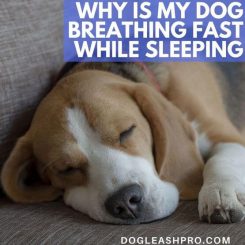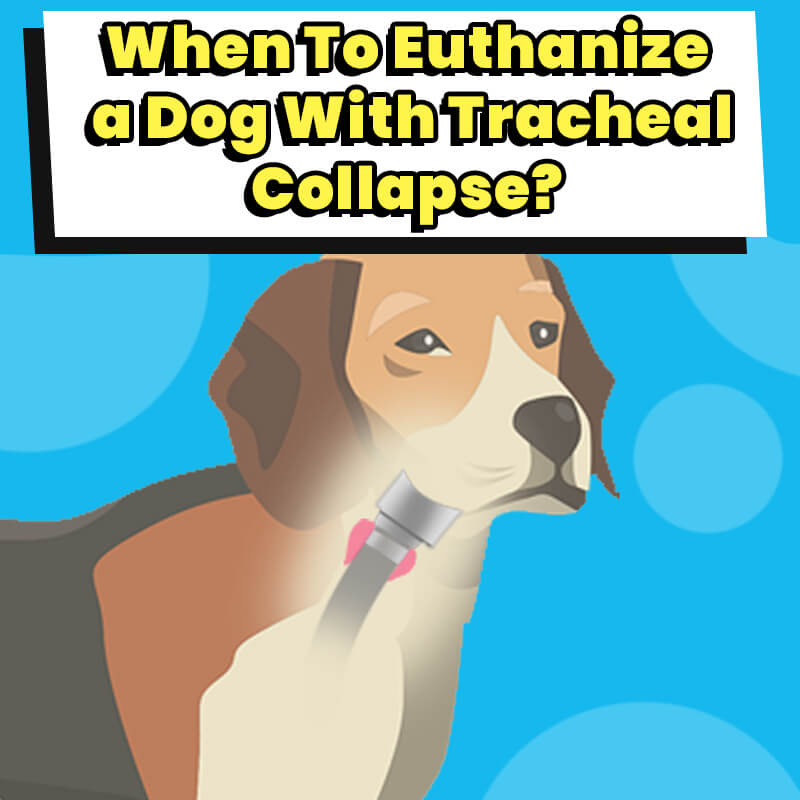
Puppy Breathing Fast While Sleeping! Should you worry or is this normal? It depends. In most cases, your puppy is breathing fast while sleeping because they having a dream or in the fourth stage of a REM cycle. Sometimes, it could be that their body is growing and thus require more oxygen. However, if your puppy is breathing fast while sleeping for more than 10 minutes, you’ll want to consult a vet.
If you have a puppy, you know that the only time he’s quiet and peaceful is when he’s sleeping. And sometimes, it’s even therapeutic and relaxing for us to watch our puppies sleep. Whether you have a dog breathing fast while sleeping or a puppy breathing fast, you’ll want to read this comprehensive guide.
We’ll list the various reasons why your puppy is breathing fast while sleeping, when you should become concerned, and how to measure your pup’s breathing rate and determine if it is normal or not. After reading this, you’ll be a bit more confident and relaxed.
Table of Contents
Puppy Breathing Fast While Sleeping: Should you worry?
In most cases, there’s really nothing to worry about if you see your puppy breathing fast while sleeping.
However, there are some cases when there is an underlying medical reason.
In this article, we’d enlighten you on why you shouldn’t worry at all if your pup breathes fast while asleep. At the same time, we will tackle the probable medical reasons behind this and if your pup needs immediate veterinary attention.
Puppies breathing fast while sleeping: Normal puppy respiration
Puppies generally breathe faster during sleep than adult dogs. To reassure new puppy parents that everything is fine, it is useful to know what is considered normal.
The normal breathing rate for a healthy puppy while completely at rest or during sleep is 15 to 40 breaths per minute, while that of an adult dog is 10 to 30 breaths per minute.
One of the reasons why puppies breathe faster while asleep is because they need more oxygen to fuel their growth and metabolism.
Rapid breathing is also their way of regulating their body temperature since dogs do not sweat as humans do.
The best time to evaluate a puppy’s breathing rate is when they are completely asleep and comfortable in their beds.
Evaluating it when they are resting right after playing or sleeping or when the room temperature is quite warm can bring different results.
Simply calculate their breathing rate by setting the alarm for 1 minute and counting the number of times their chest rises and falls.
If you notice a prolonged rapid breathing rate beyond normal, then it might be a good idea to consult your veterinarian.
Do Puppies Breathe Fast When Sleeping?
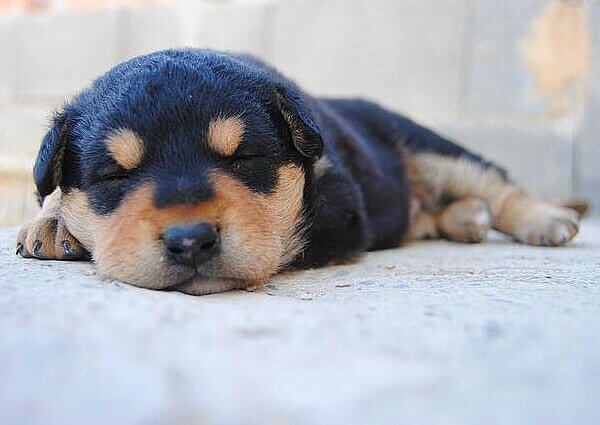
One of the major concerns of fur parents, especially for first-time dog owners is do puppies breathe fast while sleeping and if this is normal for them.
Well, did you know that just like their human families, puppies also dream? So, to answer the question “do puppies breathe heavy when sleeping?” the answer is yes, puppies do breathe heavy when sleeping when they have vivid dreams that cause them to breathe faster while sleeping.
Same as humans, puppies also go through the four (4) stages of sleep with rapid eye movement or REM, being the fourth stage. The REM stage is associated with other physiological changes such as increased heart rates and rapid and irregular breathing. So, when you notice that your puppy’s breathing is getting faster while sleeping, it is an indication that she is having a dream.
Along with rapid breathing, you might also notice that your pup’s body is twitching and in some instances, may be howling, too.
RECOMMENDED: My Dog Snores And Sounds Congested (10 Reasons & How To Help)
Are Puppies supposed to Breathe Fast When Sleeping?

Yes, you can expect puppies to breathe fast when sleeping. This is because breathing fast while sleeping is part of the normal developmental process.
You’d be surprised, but 90% of the time, puppies’ fast breathing while sleeping is because it is during this time when their bodies begin to grow and develop. A high supply of oxygen is necessary for their growing bodies to develop properly.
Sleep is also the time when their bodies recover from running, goofing, and playing around. Additionally, sleep is the time when their bodies produce a higher level of oxygen and this is only possible through faster breathing.
You’ll want to provide your puppies with a chew-proof dog bed that is both comfortable and cool. The design of the elevated dog bed helps to keep your precious pup cool all season and it also reduces stress on your pup’s joints and pressure points during his growth and development.
Is it normal for Puppies to Breathe Fast While Sleeping?
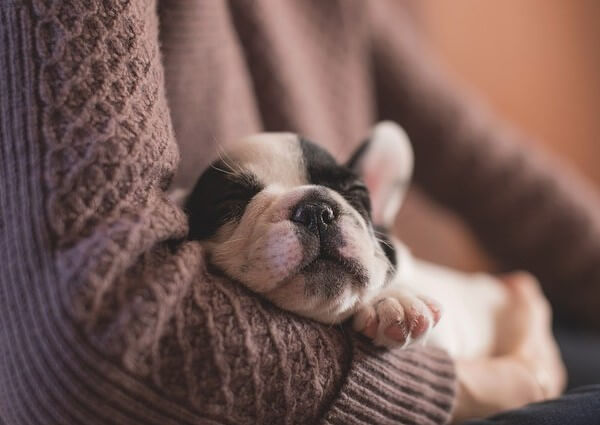
Do you always wonder if is it normal for puppies to breathe fast when sleeping? Yes, it is normal for puppies to breathe fast while sleeping.
Aside from the two (2) reasons that we cited earlier which are increased oxygen levels for optimum physical growth and REM, physical exertion or sleeping right after rough playtime is another reason why puppies tend to breathe faster while sleeping.
Moreover, fear or anxiety could also explain why puppies breathe fast while sleeping.
Let’s discuss each of these in more detail below:
Puppy Breathing Fast while Asleep: 5 normal reasons
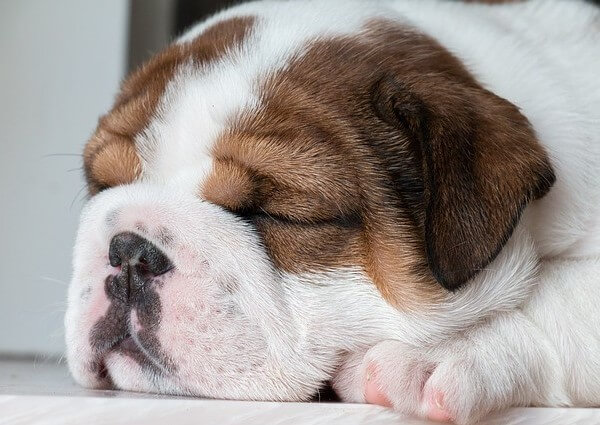
Playing and exercising right before sleep
Puppies tend to fall asleep instantly after playing. Unlike humans, dogs, regardless of age, do not sweat. In order to cool down after physical activities, they cool down through panting or rapid breathing.
If your puppy fell asleep immediately after a rough play session, she might be breathing fast because she is still catching her breath or she is still cooling down. It is common to see this 10 minutes after playing.
Don’t miss: How Long Can A Puppy Go Without Eating or Drinking?
Fear or Anxiety
A new environment, new voices and faces, and even new feeding and playtime sessions can make a puppy fearful and anxious. These feelings can potentially increase the heartbeat of nervous puppies.
Not to mention that being away from their moms and littermates for the first time can be a nerve-wracking experience for them as well. That said, fear and anxiety can cause puppies to breathe fast when sleeping.
Check out: Do Chihuahuas Bark A Lot? 8 Helpful Reasons
Temperature
Pups resort to rapid breathing or panting as a way to regulate their body temperature. They cool themselves down by letting heat escape from their upper respiratory tract, mouth, and tongue and allowing air to circulate throughout their body.
You may notice your pup breathing fast during sleep when he is enclosed in an extra warm cage or has been left outside to sleep during a warm afternoon.
Puppies are especially susceptible to heat stroke and must always be placed in a cool area where they can rest and sleep.
Stress
Stress or excitement can increase the level of cortisol in the body. Known as the fight-or-flight hormone, cortisol increases the heart rate, causing the lungs to work harder to bring in more oxygen.
To keep a pup’s nighttime routine stress-free, avoid rough play before bed and try not to feed them within an hour of bedtime. They should also be let out to use the bathroom before settling down for the night.
Supporting your puppy’s digestion can also promote overall well-being and relaxation. With PetOptimum Probiotics for Dogs, you’re giving your puppy the comfort they deserve, helping ease stress for more restful sleep. Don’t miss out on giving them the extra support that makes every nap or sleep a little dreamier.
Dreaming
If you think only humans are capable of dreaming, then you are mistaken.
Dogs, and of course, pups, dream during the REM stage of sleep typically around 20 minutes after falling asleep and stay there for 2 to 3 minutes.
You would usually notice a pup twitching or whimpering which is a sign that they are having a vivid dream.
During this stage, it is normal for the heart rate to go up, thus, causing the lungs to breathe in more oxygen.
Is it normal for Puppies to Breathe Fast in general?
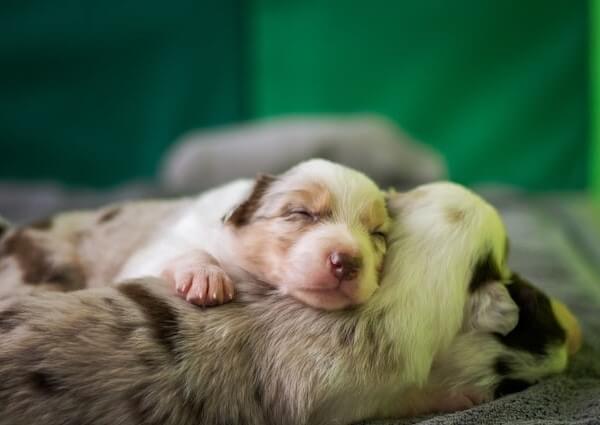
To answer the question, “is it normal for my puppy to breathe fast?”’ for as long as there are no indications of a medical problem, yes, a puppy playing or a puppy breathing fast while lying down is normal.
Excitement can increase your puppies’ heart rates which in turn, makes them breathe faster.
Anticipation of their upcoming delicious and healthy meal, playtime and even excitement from seeing their human families can result in rapid breathing.
So, if you are concerned about the issue of “do puppies normally breathe fast?” while awake, then, you have to understand that puppies are excitable little creatures, and anything that excites them can increase their heart rates and breathing.
You may be interested in: Why Does My Rottweiler Growl At Me?
Puppy Breathing Fast

How fast do Puppies Breathe?
Do you wonder why my puppy breathes fast than your adult dogs? As mentioned above, puppies require more oxygen for healthy development. To find out if your puppy’s fast breathing is still within the normal range, you have to count it while your pup is at rest.
This means that she shouldn’t be tired from playing or she is not excited over something.
Here’s an easy way to measure your pup’s breathing rate:
- Place one hand on top of your puppy’s chest.
- Set the timer for 30 seconds.
- Begin counting your pup’s breath.
- Multiply the resulting number by 2 and the number you get is the number of breaths per minute of your puppy.
The normal breathing rate for puppies is 15 to 40 breaths per minute. In some cases though, the breathing rate can be as high as 200 breaths per minute. Is this still normal? Let’s get into that a little later.
Why do Puppies Breathe Fast?

Now that we’ve tackled the non-medical reasons as to why do puppies breath fast, now let’s get into the health-related issues on why do puppies breathe so fast.
If the fast breathing is accompanied by other symptoms such as lethargy, disinterest in playing, vomiting, diarrhea, lack of appetite, swollen stomach, and breathing difficulty, then those are the signs that puppies require immediate veterinary attention.
Later on, you’d learn more about the medical problems that may be causing puppies to breathe hard. But for now, to help you figure out if your puppy’s breathing fast while asleep is normal or not, here’s a checklist that will reassure you that everything is OK with your pup:
- Fast breathing while sleeping should only last for 60 seconds. Otherwise, it can be a cause for concern.
- If the breathing pattern is more than 40 breaths per minute, it can also be a red flag that something’s medically wrong especially if other symptoms go with fast breathing.
- The gums should be moist and pink, not pale or any other color.
- The tummy shouldn’t be swollen or hard to the touch.
DON’T MISS: Puppy Has Diarrhea But Still Playful
Is it normal for a Puppy to Breathe Fast?
Yes, a puppy breathing fast is normal. But, the story is different if it comes with other symptoms such as loss of appetite and coughing.
As a fur parent, you must observe your pup if there are obvious signs that warrant a trip to the vet clinic. The best gauge is to determine if your puppy is actively interacting with you and other pets.
Also, make it a habit to count your pup’s breathing. If it is within the normal range, then, you have nothing to worry about because a puppy breathing fast is normal.
Read next: My Dog Keeps Hiccuping And Swallowing (Causes, Symptoms & Treatments)
Do Puppies Breathe Faster than dogs?
Yes, puppies do breathe faster than dogs. To make a comparison, adult dogs’ normal breathing rate is 10 to 30 breaths per minute while pups’ breathing rate is 15 to 40 breaths per minute.
Having said that, do not panic right away if you notice that my puppy is breathing fast compared with your adult dogs.
Why is my Puppy Breathing so Fast While Sleeping?
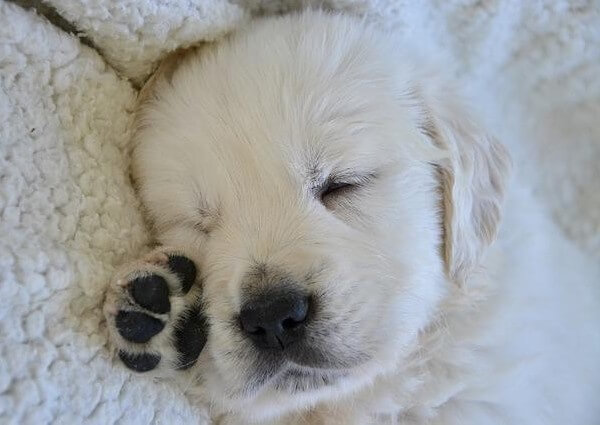
As you have learned earlier, having a dream or being in the REM stage is one of many reasons why is my puppy breathing fast while sleeping. There is no need to run to the veterinary clinic right away because this is pretty normal. If this is the case, try not to interrupt your puppy’s sleep.
Remember when we said that it is also through fast breathing that their bodies get the right amount of oxygen for proper growth?
Plus, as your puppy gets older, you’d notice that her sleep breathing pattern will slow down as she ages, more so if she is a large dog breed. This is because smaller dog breeds and those belonging to the brachycephalic dog breeds tend to breathe faster even in adulthood.
On the one hand, if there are other concerning signs like lack of appetite as to why does my puppy breath so fast when sleeping, then that is the time to have your puppy examined by a vet doctor.
Are Puppies supposed to Breathe Fast?
To answer the question, should puppies breathe fast while sleeping? Yes, puppies need a higher level of oxygen intake for proper muscle, bone, organs, and brain development.
However, if the puppies are breathing fast in situations that do not involve sleeping, playing, or cooling down after physical exertions, it is best to schedule an appointment with a vet doctor immediately.
You may also like: What Can Dogs Drink Besides Water?
How fast should a Puppy Breath while Sleeping?
The respiratory rate of puppies during sleep does not remain constant. It could increase or decrease during their sleeping cycle. At its slowest, it ranges from 15 to 40 breaths per minute, and around 200 breaths per minute at its fastest.
Rapid respiratory rate should only last for a few minutes and anything lasting more than 10 minutes should be checked by a vet.
You can calculate your puppy’s breathing during sleep by counting the number of times their chest goes up and down. Make sure they are breathing through their nose and not through their mouth, as if they are panting.
With a stopwatch at hand, count the number of times their chest inhales and exhales air for 30 seconds with one in-and-out movement counted as one. Next is to multiply the result by two. That would give you the result of their breaths per minute.
If you suspect that their breathing is not normal, you can check their temperature by gently touching their body to feel if they are warmer than usual.
The color of their gums is also a good indicator if there is something of concern. If they are pink and moist, then it should be fine. If it is very pale or rosy, have your pup checked by a vet.
A swollen or hard stomach can also be a sign that there is pressure on the lungs to exert more effort. Other concerning signs include coughing, tiredness, and noisy breathing.
Puppy Breathing 100 breaths per minute While Sleeping
A puppy breathing 100 breaths per minute sleeping may not necessarily mean that you need to immediately drive him or her to the vet clinic. If a puppy breathes this fast, it can be classified as panting.
But, should you worry right away? No, it’s because panting is considered normal and in some situations, panting is necessary as a way of cooling down. Panting helps puppies regulate their body temperatures, especially after playing.
Puppy Breathing 200 breaths per minute Sleeping
While a puppy’s normal breathing rate is 15 to 40 breaths per minute during rest, it is not unusual for him or her to reach 200 to 400 breaths per minute when they are sleeping especially after an exercise.
A puppy who just had some playtime may suddenly decide to rest and sleep and its breathing may not return to normal immediately.
It should only be of concern when their rapid breathing is prolonged and accompanied by other unusual manifestations, like lack of appetite, vomiting, and lethargy.
Why is my 4 week old Puppy Breathing Fast?
Puppies naturally breathe faster than older dogs. At four weeks of age, they are starting to walk, run, and play with their littermates and this increased activity makes their heart rates increase, thus, increasing oxygen intake.
6 week old Puppy Breathing Fast While Sleeping
At this stage, a puppy is already starting to wean from her mother’s milk and transitioning to puppy food. Your pup’s body is also developing at a faster rate necessitating oxygen to be pumped into her blood and organs.
Fast breathing during their sleep is normal and nothing to worry about. Only when it is labored and showing signs of distress that they need to be checked.
7 week old Puppy Breathing Fast While Sleeping
Seven-week-old puppies are continuing with their exploration and it is also at this time that they usually make their first visit to the veterinarian. New stimulation can bring about stress which can also contribute to faster breathing during sleep.
8 week old Puppy Breathing Fast While Sleeping
A friend recently brought home a puppy and she told me that “my 8 week old puppy is breathing fast while sleeping!”
If you have a similar experience and you observe your 8 week old puppy panting while sleeping, you do not need to panic right away. This is because heavy panting while sleeping is normal for puppies at 8 weeks of age, for as long as there are no signs like appetite loss or fever.
Puppies usually breathe more heavily from 8 weeks to 24 weeks of age. A 2 month old puppy breathing fast while sleeping could be that his or her body is going through a growth spurt.
9 week old Puppy Breathing Fast While Sleeping
At the 9th week of age, don’t freak out if your pup breathes fast while sleeping. This is all part of the growing process of a healthy puppy.
10 week old Puppy Breathing Fast While Sleeping
A ten-week-old puppy is exploring his surroundings more through his sight, smell, and taste. It is possible for them to dream about their new escapades making them breathe fast while sleeping.
Crate training is also introduced to most puppies around this age and this could cause stress. When exposed to uncomfortable situations, puppies could exhibit signs of rapid breathing while sleeping.
RECOMMENDED: How to Crate Train A Puppy in 6 Steps
11 week old Puppy Breathing Fast While Sleeping
It is around this age that their energy levels are really ramping up. They are usually lively during the morning and evening and would suddenly take a nap to rest.
Heavy breathing could be exhibited while they are taking a snooze right after strenuous activity and would usually return to normal in a few minutes.
12 week old Puppy Breathing Fast While Sleeping
12-week-old puppies gain more confidence and their brain at this point is more receptive to new commands. Residual excitement can bring about rapid breathing while sleeping.
4 month old Puppy Breathing Fast While Sleeping
Teething is at its full bloom during this stage. Obsession over chewing and gnawing at random things is commonplace. They are also reaching half their adult full weight during this month. It is normal for them to toss and turn a lot during sleep with brisk breathing through the nose.
5 month old Puppy Breathing Fast While Sleeping
Physical activity at this age is rougher and your pup is already showing signs of being an adult. It is also possible at this age for some diseases they inherit from their parents to start to appear.
It is still normal for them intermittently to breathe fast while asleep, but any prolonged panting behavior during rest should be checked by a vet.
My Puppy is Breathing Fast While Sleeping: Is it due to stress?
Yes, stress can also be one reason your puppy is breathing rapidly during sleep. Stress or fear can take many forms. Separation anxiety, new environments, and even exposure to other pets can bring about anxiety.
Paying close attention to your dog’s behavior can give you a clue as to how she is feeling. Signs you should look for are excessive drooling and barking, changes in posture, shaking, constant pacing, tucked ears, showing the white of their eyes, and panting.
RELATED: Do Dogs Get Tired Of Barking?
When you see a sign of stress in your puppy, gradually remove her from that situation and place her in a quiet place where she can re-group.
Exercise, like walking or a game of frisbee, is another good way to release tension not only physically but also mentally.
Puppy Breathing very Fast While Sleeping: Is it linked to health conditions?
Yes, for some puppies, the fast breathing while sleeping is due to an underlying health condition such as the following:
1. Respiratory Conditions
A puppy’s windpipe is called a trachea. If for some reason, the trachea collapses, one of the first symptoms that will manifest is rapid breathing.
In most cases, tracheal collapse is hereditary. This disease can affect all dog breeds but is commonly seen among Pomeranians, Shiz Tzus, Lhasa Apsos, Toy Poodles, Yorkshire Terriers, and Chihuahuas.
Another respiratory issue that can causes rapid breathing while sleeping is asthma. This occurs when the windpipe gets swollen or inflamed due to irritants. The puppies may seem like they are breathing fast but if it is accompanied by labored breathing or panting, it’s time for a veterinary assessment for asthma.
2. Lung disease
There are a number of lung diseases or conditions due to certain bacteria or viruses that can affect a puppy, like pneumonia, kennel cough, and influenza. Let’s discuss each of them in more details.
2a. Kennel Cough
Kennel Cough, or canine infectious respiratory disease (CIRD), is infectious bronchitis that can be caused by bacteria, viruses, or mycoplasma. It brings about inflammation in the trachea resulting in a dry, hacking cough, especially during the night.
As we can see, this is a respiratory infection that constricts the upper airways resulting in fast breathing. If it is accompanied by fever, it is most likely the highly contagious kennel cough.
2b. Pneumonia
Pneumonia is a disease that causes the microscopic air sacs in the lungs to be inflamed. The common culprit is a viral infection of the lower respiratory tract, but bacteria such as Streptococcus and Bordetella bronchiseptica can also cause the disease.
2c. Influenza
Canine influenza virus (CIV) or dog flu is caused by either the H3N8 or H3N2 strain that brings about symptoms of cough, runny nose, and fever. It is typically spread through contaminated objects and respiratory secretions from infected dogs.
3. Diaphragmatic hernia
A form of diaphragmatic hernia found in puppies is called a peritoneal-pericardial diaphragmatic hernia (PPDH). it is typically congenital resulting in faulty development of the diaphragm in the fetus.
Puppies with this condition present with labored breathing and an irregular heartbeat, and the only solution to ease the difficulty is through surgery.
4. Pain
Dogs are good at concealing pain. It was a survival tactic that their ancestors employed against their enemies in the wild so as not to be seen as the weaker species.
This behavior is still intact among our domesticated dogs but if you’re an observant fur parent, you can easily detect if there’s a change in the breathing patterns of your puppy.
One of the typical signs of puppy pain is breathing fast while sleeping and during waking hours.
Exposure to pain activates the stress hormone known as cortisol which plays a role in numbing pain. Increased cortisol also results in increased heart rate and faster breathing in puppies.
If you suspect that your puppy is in pain, do not attempt to give pain medicines. Instead, head out to the veterinary clinic right away. The veterinarian will conduct a series of physical examinations to pinpoint the exact location of the pain.
Blood tests, ultrasounds, and radiography may also be necessary especially if the vet suspects that it is a case of juvenile hip dysplasia.
Though hip dysplasia is more common among older dogs, there are cases of puppies that are seen to be suffering from this problem as early as 5 months. Genes play a major role but obesity and poor diet can also be the cause.
Depending on the diagnosis, the common pain medicines prescribed for puppies in pain are non-steroidal medicines. Supplements may also be given such as glucosamine to bring down swelling.
5. Food Poisoning
Puppies are notorious for eating just about anything. If fur parents failed to remove toxic food and substances around the house, puppies will naturally devour these.
Fast breathing is one of the symptoms of food poisoning. Three of the human foods that can result in food poisoning in dogs are chocolate, garlic, and onions.
Let’s go over each of the food poisoning below:
Chocolate poisoning
Theobromine is a chemical found in chocolates that prove to have adverse effects on our dogs. Chocolates also have minimal traces of caffeine.
While theobromine and caffeine can be processed by humans, our dogs take a longer time to break down and excrete these two which results in chocolate toxicity.
The signs of chocolate poisoning can be seen 22 to 24 hours after intake and some of the symptoms are rapid breathing and increased heart rate.
Garlic and Onions toxicity
Garlic and onions can cause food poisoning in our dogs because of the compound N-propyl disulfide.
This is a compound that damages the red blood cells of dogs and causes hemolysis and anemia. Aside from increased heart rate and faster breathing, the signs include pale gums and lack of coordination.
Check out: Can Dogs Eat Spoiled Meat? The Dangerous Truth!
Instead of feeding your puppies human food, a great alternative is to feed them fresh and healthy dog food that’s made with real ingredients like the Ollie Fresh Dog Food.
Ollie dog food is tailored to your puppy’s specific nutritional needs to ensure they stay healthy, active, and happy.
6. Anemia
Anemia is a condition caused by reduced production of red blood cells and or hemoglobin. This issue causes a decreased amount of oxygen that is transported around the system.
As a result, anemic puppies suffer from shortness of breath and labored breathing.
7. Heart Disease
Puppies diagnosed with congenital heart problems breathe faster than healthier puppies mainly because of the inability of the heart to pump more blood around the body.
This leads to increased pressure in the heart valves causing blood vessels to leak some fluid into the lungs. Accumulation of fluid makes it difficult for the lungs to expand which results in fast breathing.
If a pup has a congenital heart problem, the first sign is usually fast breathing. The other symptoms to look for are lack of appetite, lethargy, and coughing.
8. Parvovirus infection
Parvovirus is a contagious viral disease that is transferred via infected feces. Parvovirus causes gastrointestinal distress such as bloody diarrhea.
In some cases, the virus also targets the heart muscles of the puppies which is referred to as cardiac parvo.
Puppies with cardiac parvo will die due to rapid breathing as a result of accumulation of fluid in the lungs.
Untreated puppies will pass away in about 72 hours unless your puppy gets veterinary care right away.
How do I know if my puppy will survive parvo? Signs like showing interest in eating, drinking, and playing are indications of getting well. Plus, if there are no more traces of blood in the poop and the vomiting has stopped.
9. Internal parasites
Puppies can get infected with intestinal and lungworm parasites. Puppies get infected with lungworm larvae via nursing from their mothers.
The larvae travel from the gastrointestinal tract to the heart and lungs. The signs of lungworm infections in puppies are fast breathing, wheezing, and coughing.
DON’T MISS: White Specks in Dog Poop (Not Moving): What Should You Do?
10. Severe dehydration (hypovolemia)
This is a condition wherein the puppy loses a significant amount of fluids that causes reduced blood circulation and oxygen supply thereby causing rapid breathing.
Why does my puppy heartbeat fast while sleeping?
New dog owners might wonder why do puppies heart beating fast when sleeping?
Puppies generally have rapid heartbeats ranging from 160 to 200 beats per minute as opposed to an adult dog that is 60 to 140 beats per minute. Allow us to stress that the rate of heartbeat is not the same as the rate of breathing.
It is when their pulse rate gets exceedingly fast or slow that you should be worried.
A faster rate than normal could indicate heatstroke, dehydration, or fever, while a slower rate may mean heart disease or shock.
Most of the time, a puppy fast heartbeat when sleeping is nothing to be concerned about. Asking your veterinarian for what is considered an acceptable heart rate will give you less anxiety about the health of your pup.
Puppy Breathing Fast When Sleeping: Could it be the temperature in my home?
Dogs do not have sweat glands as we humans do. They regulate their body temperature by panting or rapid breathing and also by sweating their paw pads.
If you notice your puppy having moist paw pads accompanied by panting while asleep, then it might be that it is too warm around your house.
The normal body temperature of dogs is 101°F to 102.5°F. If it goes higher by 3 to 4 degrees, your puppy may be suffering from heat stroke.
Puppy Fast Breathing While Sleeping: Could it be their breed type?
Puppies breathe fast while sleeping due to their small lungs and developing diaphragms.
This eventually diminishes as they mature especially larger dogs. Some breeds though are more prone to rapid breathing during sleep, like the brachycephalic breeds.
Boxers, French Bulldogs, Pugs, Shih Tzus, and the Pekingese are just some brachycephalic breeds that have shortened skulls and snouts. Their upper airways are constricted making them more prone to panting and rapid breathing.
If you have these breeds of dogs, it would be useful to be familiar with their normal breathing patterns to make sure they are not suffering from any disease.
The red flags you should be aware of are coughing, vomiting, retching, and decreased physical activity.
Puppy Breathing Fast in Sleep: When should I be worried?
The things to look out for when you think your puppy did not get a good night’s sleep due to heavy breathing are the following:
- Tiredness during the day.
- Loss of appetite.
- Coughing.
- Vomiting.
- Fever.
- Pale gums.
- Prolonged rapid breathing and panting during daytime.
Puppy fast Breathing When Sleeping: What should I do to help?
In most cases, there is really nothing to worry about when you notice your puppy breathing fast when sleeping. It is just part of her developmental growth.
But, if you think something is amiss with your puppy, you can always calculate the rate of her breathing first, as discussed above.
Taking her temperature and measuring her pulse can also determine if she is suffering from a sickness. If she has a high fever accompanied by a rapid heart rate, then you should visit your vet right away.
Puppy Breathing heavy While Sleeping vs Puppy Panting While Sleeping
The main difference between puppy panting and heavy breathing during sleep is that the mouth is partially open during panting with the tongue sticking out.
A puppy simply breathing heavily during sleep has its mouth closed with a noticeable rapid up-and-down movement of the belly.
Do Puppies pant in their sleep?
Yes, puppy panting in sleep is common and the reasons are pretty much the same for heavy breathing during sleep.
The most common reason why you see a puppy panting in his sleep is that she feels warm and she needs to normalize her body temperature.
Newly adopted puppies can also exhibit this behavior. Having unfamiliar surroundings and being separated from their mother and littermates, it is normal to see a new puppy panting while sleeping.
Breathing problems and pain are also possible reasons for a panting puppy while sleeping. If they show signs of excessive drooling, moaning, coughing, and lethargy, then their body is probably responding to a health problem.
Why is my Puppy panting While Sleeping?
It is not at all unusual for a puppy to pant while sleeping. Fast breathing and panting during sleep are perfectly normal and your puppy is probably just dreaming. Their breathing patterns can fluctuate during their sleeping cycle.
Puppy Breathing Fast While Sleeping: Final Thoughts
As pet owners, it is normal for us to worry about our little furry friends. Watching them grow before our eyes are nothing short of a miracle and looking after them is our utmost responsibility.
After discussing all the possible reasons why our pups breathe heavily during sleep, we have gained more knowledge and less worry about our dog’s behaviors.
The most important thing to remember is to always look for signs that accompany fast breathing such as loss of appetite and fever. If none, relax because all is well with your growing pup.
DISCLAIMER: THIS WEBSITE DOES NOT PROVIDE MEDICAL ADVICE
The information, including but not limited to, text, graphics, images and other material contained on this website are for informational purposes only. No material on this site is intended to be a substitute for professional veterinary advice, diagnosis, or treatment. Always seek the advice of your veterinarian or other qualified health care provider with any questions you may have regarding a medical condition.
Resources:
https://vcahospitals.com/know-your-pet/home-breathing-rate-evaluation

With over five years of specialized experience as an animal writer, my expertise lies in dog nutrition, health, behavior, grooming, and training. I am dedicated to delivering helpful and informative content that caters to the well-being of our furry friends. My primary goal is to empower pet owners with knowledge and ensure our canine companions thrive in health and happiness. In my free time, I love volunteering at local dog rescue centers.








